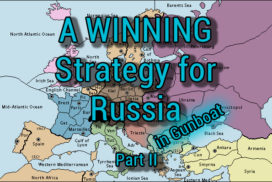Can Russia solo win in a high-level match of Gunboat Diplomacy?
Yes.
Oh, wait, you were probably expecting a long-winded explanation, right?
Okay, let me try again.
I sat down to write this article because I just finished (and won!) a fairly high-level Gunboat Diplomacy match where I played as Russia. I want to share with you, dear reader, what I did to achieve this win.
Solo winning as Russia in Gunboat Diplomacy—especially against high-level opponents—is a big deal. Despite playing at a high level consistently for several years, I have not achieved a Russian win in a high level match…until now![1]Even counting low-level matches, I think it is has been two or three years since I’ve won as Russia in Gunboat.
Over the past few years, I have been working very hard at improving at Gunboat Diplomacy. I have risen up the ranks of webDiplomacy’s Gunboat ladder, and I think that the skills I developed over these years substantially contributed to my success in general and this win in particular.
In this series of articles, I will explain why it is such a big deal to solo win as Russia in a high-level Diplomacy match—and what I believe I did to help me achieve this win. If you learn from me, I bet that you will be able to win as Russia too!
How Much Does Russia Suck?
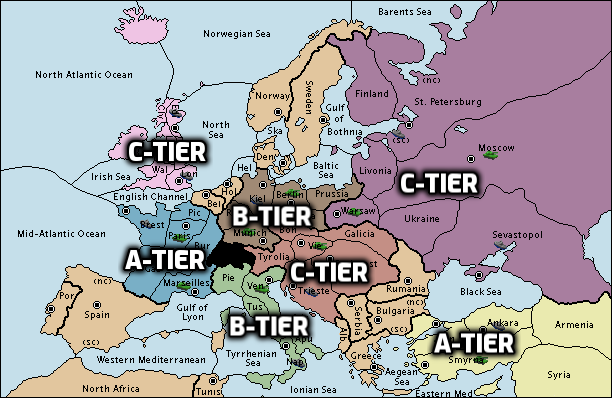
My Tier List for Gunboat Diplomacy is one of my more popular posts. In that article, I characterized Russia as the weakest of all 7 powers in Gunboat Diplomacy…but I would not quite admit that Russia belongs in the “F-Tier” (a label that I defined as applicable to any game character/faction/etc. that cannot actually win against competent opponents):
To succeed with Russia requires the good fortune of having inexperienced neighbors (e.g., a German player who opens with Kiel to Holland and thus can’t contest Sweden, or an Austrian player who attacks Italy in 1901) or else experienced neighbors (e.g., an English player who prioritizes war with France over conquering St. Petersburg, or a Turkish player who knows how to play the Turkish/Russian “Juggernaut” alliance in Gunboat). And when Lady Fortuna smiles upon the Russian player, clever tactical moves and wise strategic choices are still required for the Russian player to prevail (oh how many matches I have seen where Russia balloons in size, only to be rolled backwards by a French solo win attempt or gutted by a Turkish backstab).
Your Bored Brother, Tier List for Gunboat Diplomacy
Russia is considerably weaker than England and Austria, but I cannot place Russia in the “Trash / F-Tier” because, I must admit, it is possible to win as a Gunboat Russia. I do encounter Russian wins from time to time, even in high-level matches. Also, Russia has a reasonable ability to sneak into a draw by holding onto Moscow, which is often an essential center to forming a stalemate line.
Since I published that article, many players have told me that my disparaging assessment of Russia’s standing in Gunboat was too generous! They have said that it seems virtually impossible to win as Russia in Gunboat Diplomacy without opponents making major, unforced blunders early and often. In other words, that Russia does not realistically stand a chance of winning if the other players have basic competence.
I have come very close to agreeing with them. I have won as Russia in Gunboat Diplomacy a few times over the years (and lost to Russian solos here and there as well), but—as far as I can recall—in my matches where Russia won, some of the players were rather inexperienced.
Nevertheless, I have had no choice but to deny the conclusion that Russia is “unwinnable” in high-level Gunboat matches, because anyone can search webDiplomacy and find a few apparently-high-level games where Russia did win. I didn’t play in these matches, so it has been difficult for me to give advice on how to recreate those winning conditions. I did not have much to say other than “it’s somehow possible.”
Even now, I can’t really tell you what the those other winners did right. But I can tell you what I did!
Early Game: A Mixed Bag
In my Tier List article, I described some early-game situations outside of Russia’s control that had a big impact on Russia’s ability to eventually solo win. My larger point was that these situations are so common and so difficult to overcome that Russia needed to “get lucky”—very lucky—to even have a shot at winning. Specifically I pointed to:
- Russia needing flat-out novices as neighbors to gain an early advantage. (Something that by definition will not exist in a high-level match.)
- Alternatively, Russia needing experienced neighbors who try to ally (or at least, not attack) Russia early on. Specifically—and I imagined, perhaps critically—Russia needs England to not wipe out St. Petersburg in the first 2-3 years. (In my mind, an experienced English player would hopefully know of the danger of attacking Russia before France has been dealt with).
- The danger that Russia approaching a solo win can actually (and more often) trigger a French solo win. (This is because a dominant France can typically roll back Russia’s gains in the North faster than Russia can reach 18 supply centers.)
I’m reconsidering that analysis. In my recent match:
- Nearly (but not quite) all the players were of considerable skill and experience. At the time of the match, England and France were in the top 15 ranks of webDiplomacy gunboaters. Germany had played on webDip for over 4 years and was not quite ranked in the top 50. Austria was my original mentor![2]Who I have had the pleasure to play with many, many times over the years. We usually attack each other early and often. I feel like Darth Vader sensing the presence of my old master… The Italian player had just under 400 finished Gunboat matches on webDiplomacy. Only Turkey stands out to me as relatively inexperienced at Gunboat, but during the match they did not come across as a novice or somehow incompetent.
- I was immediately shut out of the North. Germany blocked me from taking Sweden in 1901. England attacked me at St. Petersburg immediately, succeeded, and even stole Moscow from me in 1903. Thus, I experienced one of my worst-ever starts for “Northern Russia,” which (according to my usual way of thinking about Russia in Gunboat) should have made my solo win next-to-impossible.
- I came perilously close to triggering a French solo win en route to my own victory. There is no other way to put it: by attempting my solo win, I was playing with fire.
However, two things did work out for me during the early game:
- The Turkish player—despite their evidently low experience level—cooperated with me early on and we had a bit of a juggernaut going for a few years.
- The Italian immediately attacked Austria, which is unusual (but not unheard of) in a high-level game. That attack on Austria allowed me to pick up centers to make up for the loss of St. Petersburg and Moscow (losses which otherwise might have been permanently debilitating).
So my start for Southern Russia was excellent. On average, I was off to an average Russian start; I controlled just 5 centers at the end of 1903.
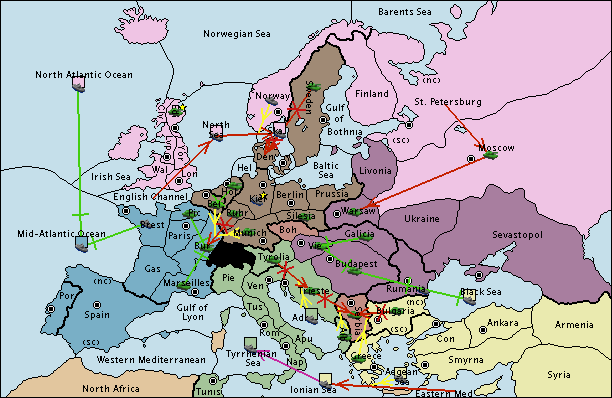
This position is (obviously) recoverable, but how did this mediocre start lead to a winning outcome? Read on!
Note: The rest of this series assumes you are familiar with my general guide on getting solo wins in Gunboat Diplomacy, as well as my guide for Russia in particular. If you haven’t read those before, you might want to check those over before continuing.
Mid Game: I Played Russia According to Russia’s Capabilities
It is an understatement to say that Russia is not tactically powerful in Gunboat Diplomacy. Therefore, depending on sheer power—that is to say, on making moves that are tactically difficult to counter—is not an effective way to carry Russia into a strong endgame.
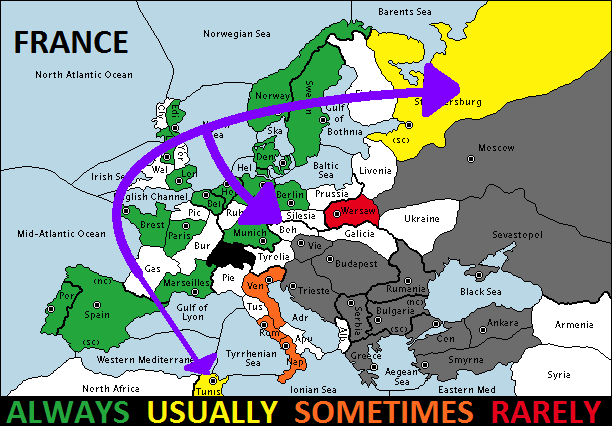
This is very different than, say, France or Turkey. Those powers can solo win in Gunboat without ever cooperating meaningfully with an ally. France and Turkey simply need their neighbors to start fighting each other, and once that situation exists they can freely make a concentrated attack against one neighbor—or even two! The strategy of concentrating movement in one direction allows these corner powers to gain momentum that puts them on the trajectory to a solo win without the need for trust from (or cooperation with) other players. Like tossing a spear, these powers can throw a mass of units in one direction and conquer almost all the centers need to solo win. Importantly, this leaves behind an area of captured centers that is free from the threat of enemy attack.
By contrast, Russia is alllll over the place…
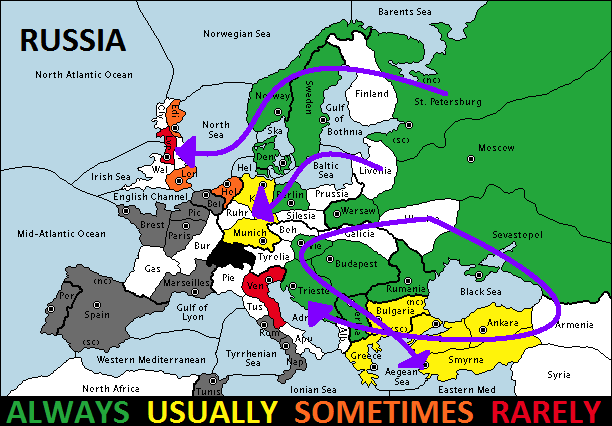
Russia cannot succeed by concentrating firepower in a single direction. First of all, such concentration will typically leave Russia exposed on at least one flank. Second, there is no grand payoff like there is for France (who can reach 17 centers just by rolling up the North). In a Gunboat game, Russia is never going to roll up the entire North or the entire South; either advance will stall out. Thus, Russia needs to eventually apply power on multiple fronts to achieve a solo win.
And indeed, Russia is born fighting on multiple fronts. Russia’s inherent advantage over other Southern powers is that Russia, uniquely, can build fleets in the north.[3]This advantage is balanced out by Russia’s Southern port (Sevastopol) being the worst Southern port by a significant margin; it is almost impossible to bring those Southern fleets somewhere useful, even if Turkey is destroyed. Russia, uniquely, has 4 home centers—and these centers straddle the middle of the map. And because St. Petersburg has two coastlines that function differently for fleets (including newly-built fleets, which can be built on either coast), Russia might be described as having something like “4.5 home centers.” Each of the 5 build locations comes with immense tactical and strategic implications and potentially signals much about Russia’s intentions.[4]Consequently, Russia faces the most challenging build decisions of any power.
The logistical challenge for Russia is that Russia can’t be everywhere at once. In Press Diplomacy, Russia can often use messaging to secure unguarded flanks to focus on gains in one region. But in Gunboat Diplomacy, securing a flank without force is far more difficult.
One Sphere at a Time
In this match, I had my choice made for me; my entire Northern flank was destroyed by 1903. I therefore had three major mid-game goals, in the following order of priority:
- Finish off Austria, getting as many centers for myself as possible.
- Attack Turkey, getting as many centers for myself as possible.
- Regain St. Petersburg.
I prioritized this way because, having faced the loss of St. Petersburg early on, I presumed I would never make major gains in the north. Thus, I would have to take over a huge portion of the South to have a shot at winning, which meant that I had to consume all the Turkish centers and Balkans. I also anticipated that I would probably make it into any draw if I reached a big enough size in the South.
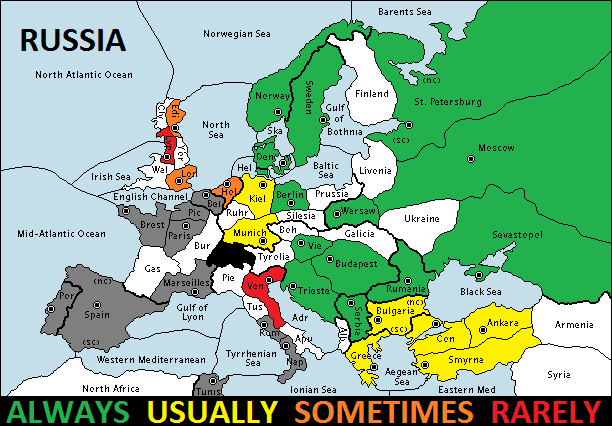
I did not pretend that I would be able to solo win by somehow rolling up the entire South; it is just too difficult for Russia to get enough of a fleet presence into the Mediterranean with enough time left on the stalemate clock to actually reach 18 centers. Thus, I knew that at some point I had to regain St. Petersburg and eventually build some fleets from that port! With that third goal looking hard to achieve, a solo win did not at all seem likely to me in 1903.
I Realized I Might Have a Real “Ally” in Italy
By 1907, I had stabilized. I regained Moscow and claimed most of the Balkans.
Italy had, for the most part, cooperated with me in taking down Austria. I suspected Italy as being a thoughtful, experienced, alliance-oriented player. To fully articulate how I came to that perception would require me to have kept a thorough journal similar to what I did a few years’ back. I didn’t do that, so unfortunately you will have to simply take my word for it that I thought deeply about how the Italian player seem to be choosing their moves, how they sent and responded to signals, and so forth. I reached an (accurate!) conclusion about that player’s habits and playstyle.
Having made this determination, I supported the Italian player’s likely moves. I dispensed gratuitous assistance upon my rival with the anticipation that this assistance would be reciprocated, potentially to such an extent that Italy would help me finish off Turkey as well as Austria, potentially to such an extend that Italy wouldn’t attack me after we had eliminated Austria and Turkey.
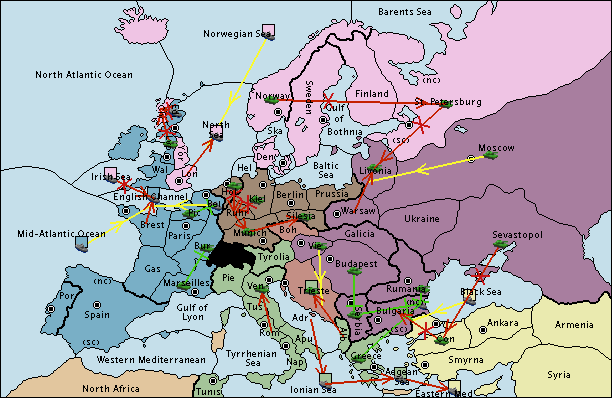
Meanwhile, the English player suffered the fate they deserved: destruction at the hands of France. I personally think that immediately expanding eastward as England is a terrible English strategy for Gunboat because what is likely to happen…is exactly what happened in this match.
I turned out to be right about Italy. We finished off Turkey together, and Italy turned around to fight France (who by 1910 was quite menacing).
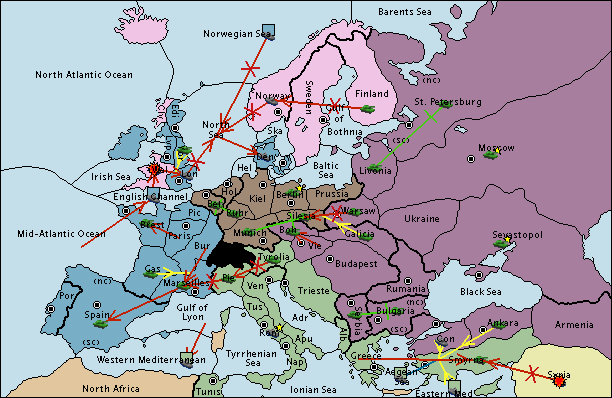
Note that I did my best to appear to be a loyal ally of Italy (I moved Vienna to Bohemia and supported Italy’s attack on Smyrna)…but at the same time maintained many units in position to attack Italy at my discretion.
Ready for more? Click on to read Part 2!
Footnotes
| ↑1 | Even counting low-level matches, I think it is has been two or three years since I’ve won as Russia in Gunboat. |
|---|---|
| ↑2 | Who I have had the pleasure to play with many, many times over the years. We usually attack each other early and often. I feel like Darth Vader sensing the presence of my old master… |
| ↑3 | This advantage is balanced out by Russia’s Southern port (Sevastopol) being the worst Southern port by a significant margin; it is almost impossible to bring those Southern fleets somewhere useful, even if Turkey is destroyed. |
| ↑4 | Consequently, Russia faces the most challenging build decisions of any power. |


